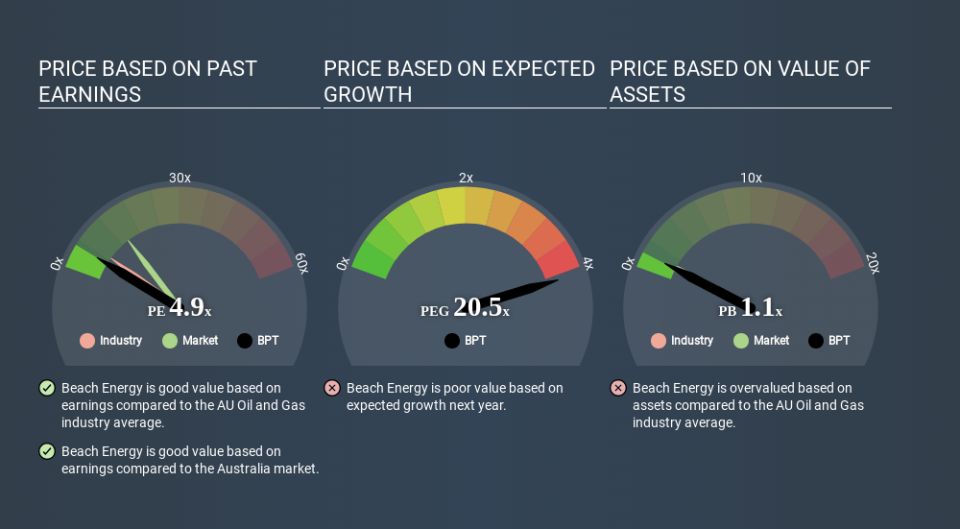How Does Beach Energy's (ASX:BPT) P/E Compare To Its Industry, After Its Big Share Price Gain?

Those holding Beach Energy (ASX:BPT) shares must be pleased that the share price has rebounded 31% in the last thirty days. But unfortunately, the stock is still down by 53% over a quarter. But shareholders may not all be feeling jubilant, since the share price is still down 44% in the last year.
All else being equal, a sharp share price increase should make a stock less attractive to potential investors. In the long term, share prices tend to follow earnings per share, but in the short term prices bounce around in response to short term factors (which are not always obvious). So some would prefer to hold off buying when there is a lot of optimism towards a stock. One way to gauge market expectations of a stock is to look at its Price to Earnings Ratio (PE Ratio). A high P/E ratio means that investors have a high expectation about future growth, while a low P/E ratio means they have low expectations about future growth.
See our latest analysis for Beach Energy
How Does Beach Energy's P/E Ratio Compare To Its Peers?
We can tell from its P/E ratio of 4.93 that sentiment around Beach Energy isn't particularly high. If you look at the image below, you can see Beach Energy has a lower P/E than the average (6.9) in the oil and gas industry classification.
This suggests that market participants think Beach Energy will underperform other companies in its industry. While current expectations are low, the stock could be undervalued if the situation is better than the market assumes. You should delve deeper. I like to check if company insiders have been buying or selling.
How Growth Rates Impact P/E Ratios
Probably the most important factor in determining what P/E a company trades on is the earnings growth. If earnings are growing quickly, then the 'E' in the equation will increase faster than it would otherwise. And in that case, the P/E ratio itself will drop rather quickly. A lower P/E should indicate the stock is cheap relative to others -- and that may attract buyers.
It's nice to see that Beach Energy grew EPS by a stonking 48% in the last year. And earnings per share have improved by 58% annually, over the last three years. With that performance, I would expect it to have an above average P/E ratio.
Don't Forget: The P/E Does Not Account For Debt or Bank Deposits
The 'Price' in P/E reflects the market capitalization of the company. That means it doesn't take debt or cash into account. Hypothetically, a company could reduce its future P/E ratio by spending its cash (or taking on debt) to achieve higher earnings.
Spending on growth might be good or bad a few years later, but the point is that the P/E ratio does not account for the option (or lack thereof).
Beach Energy's Balance Sheet
The extra options and safety that comes with Beach Energy's AU$65m net cash position means that it deserves a higher P/E than it would if it had a lot of net debt.
The Verdict On Beach Energy's P/E Ratio
Beach Energy has a P/E of 4.9. That's below the average in the AU market, which is 14.1. It grew its EPS nicely over the last year, and the healthy balance sheet implies there is more potential for growth. One might conclude that the market is a bit pessimistic, given the low P/E ratio. What we know for sure is that investors are becoming less uncomfortable about Beach Energy's prospects, since they have pushed its P/E ratio from 3.8 to 4.9 over the last month. If you like to buy stocks that could be turnaround opportunities, then this one might be a candidate; but if you're more sensitive to price, then you may feel the opportunity has passed.
When the market is wrong about a stock, it gives savvy investors an opportunity. If the reality for a company is not as bad as the P/E ratio indicates, then the share price should increase as the market realizes this. So this free visual report on analyst forecasts could hold the key to an excellent investment decision.
You might be able to find a better buy than Beach Energy. If you want a selection of possible winners, check out this free list of interesting companies that trade on a P/E below 20 (but have proven they can grow earnings).
If you spot an error that warrants correction, please contact the editor at editorial-team@simplywallst.com. This article by Simply Wall St is general in nature. It does not constitute a recommendation to buy or sell any stock, and does not take account of your objectives, or your financial situation. Simply Wall St has no position in the stocks mentioned.
We aim to bring you long-term focused research analysis driven by fundamental data. Note that our analysis may not factor in the latest price-sensitive company announcements or qualitative material. Thank you for reading.

 Yahoo Finance
Yahoo Finance 
